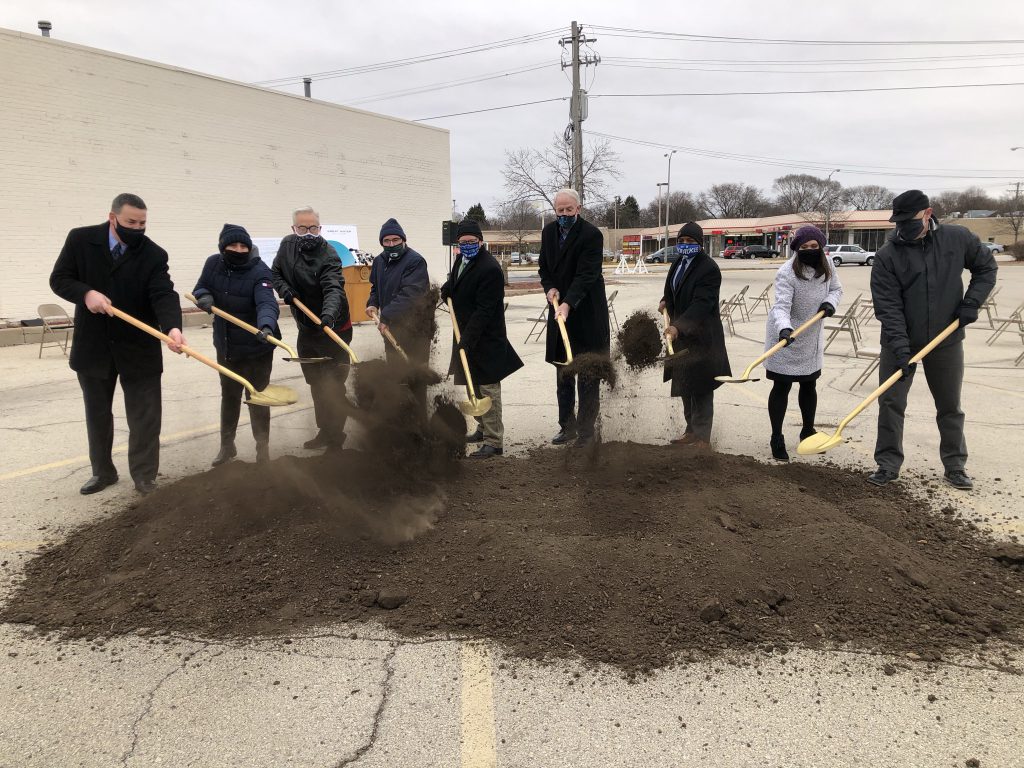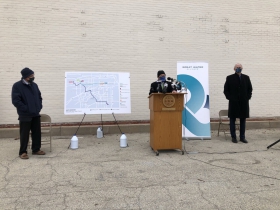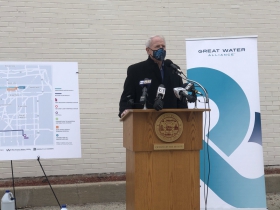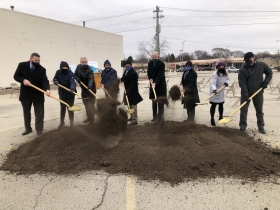Waukesha, Milwaukee Celebrate Huge Water Project
$286 million, 36-mile-long project begun, will bring Milwaukee water to Waukesha.

Mayors Shawn Reilly and Tom Barrett are flanked by city officials as they celebrate the Great Water Alliance groundbreaking. Photo by Jeramey Jannene.
It will take until at least September 2023 for a City of Waukesha resident to be able to turn on their tap and pour a glass of Lake Michigan water, but officials from both Milwaukee and Waukesha are already celebrating the partnership.
To Waukesha it represents the end of a two-decade quest to find a safe drinking water source, to Milwaukee it means a new revenue source, but for all it’s the largest inter-government agreement in southeastern Wisconsin history.
A Milwaukee Water Works pumping station will be constructed on the site, the start of a 36-mile-long, 30-inch-wide pipe network that will criss-cross eight communities as it sends city water out of the Great Lakes Basin to Waukesha and sees it returned, already treated, via the Root River in Franklin. Construction on Waukesha’s local infrastructure has already started.
“Today is a great morning,” said Waukesha Mayor Shawn Reilly, noting that it would end a problem of increasing radium levels in well water. “This is a win for both our communities, but it is also a model for the kind of collaboration our region needs.” He said he hopes it leads to increased cooperation on future issues.
Milwaukee Mayor Tom Barrett said the cities have a lot in common, notably their working-class roots. He praised Reilly, in office since 2014, for working to get the deal done.
“It was extremely important for those of us in Milwaukee to focus on the residents of the City of Waukesha and the needs of people in the City of Milwaukee at the same time,” said Barrett, hinting at one of the original stumbling blocks of the deal. “And I say that because part of this debate is about urban sprawl. Is the City of Milwaukee going to subsidize families and individuals moving from the city to large homes and huge lots in a way that will destroy the tax base of the city and increase the racial issues that we face in southeastern Wisconsin?”
“We felt that by having an agreement on the City of Waukesha proper and the City of Milwaukee proper we were dealing with the real issues of water sustainability for the City of Waukesha,” he said.
But Reilly defeated Scrima in 2014, and in 2017 announced, with Barrett, the Milwaukee-Waukesha deal had been revived. The cities’ legislative bodies ratified it shortly thereafter.
“That was only one hurdle. The second hurdle, of course, was the national and international ramifications of what we are doing here,” said Barrett. The deal, because it involved sending water out of the Great Lakes watershed, had to be approved by governors of the eight states bordering the Great Lakes as part of the 2008 Great Lakes Compact. “What you have here is layer after layer after layer after layer of governments that had to find a way to negotiate this.” The Waukesha deal is the first such diversion approved under the compact.
“This I believe is a new beginning of regionalism,” said Milwaukee Common Council President Cavalier Johnson. “I am looking forward to a future in which we don’t just celebrate a Great Water Alliance, we celebrate a great transit alliance, we celebrate a great housing alliance with a number of the communities around Milwaukee.”
Daniel Duchniak has served as the general manager of Waukesha’s water utility since 2003. “The challenge of resolving Waukesha’s water issues, believe it or not is actually what brought me to Waukesha almost 18 years ago and what a journey it has been,” said Duchniak. He said the effort involved not just engineering and politics, but community outreach and “an attorney or two.” Now that the pipes are going into the ground, he added, it seems anti-climatic. “It’s what water utilities do.”
The deal is expected to save Waukesha water customers $40 million over other alternatives just in up-front capital costs, and an estimated $200 per customer annually. The move will net a major new customer for the city-owned Milwaukee Water Works and funding which Milwaukee intends to use to replace lead laterals. The city-owned utility currently sells water to 14 communities plus the city and the Milwaukee County Grounds. Franklin, a portion of which is already served by the utility, could join Waukesha as a new customer by 2024.
Milwaukee Water Works Superintendent Karen Dettmer said the new pumping station reflects a change from the original plan to put a pumping station near S. 60th St. and W. Howard Ave. The new location, at area Alderman Mark Borkowski‘s suggestion, avoids locating the facility in a residential area. It will also save costs by shortening the pipeline. “It’s amazing, it’s efficient and it comes with that great collaboration,” she said. Borkowski said he was honored to play a small part in the bigger deal.
“This was a very underutilized parking lot, so the acquisition was fairly easy,” said Dettmer of the property at 7501 W. Oklahoma Ave. The City of Waukesha acquired the 9,857-square-foot property and will sell it to Milwaukee said Dettmer. A 1,000-square-foot pumping station will be constructed.
The city won’t begin constructing the pumping station until 2021, despite the golden-shovel dirt toss. “For the contractors out there be on the lookout for a [request for proposals] to submit bids,” said Dettmer. In 2017 the pumping station had an estimated cost of $18 million. An underground pumping station just to the east along Honey Creek will be decommissioned. Dettmer said the facility is aging. City documents refer to it as “non-conforming.”
Waukesha will begin paying Milwaukee at least $3.2 million annually once the project is complete. The payments will rise to $4.5 million if Waukesha uses the full 8.2 million gallons the deal allows. Those funds will go to the city-owned water works. As part of the deal, Waukesha is also required to make a one-time payment of $2.5 million, proceeds of which will go to the city’s general fund and is intended to be used to replace lead laterals that connect private properties to city water mains. If Waukesha increases its consumption to 8.5 million daily gallons, the city will owe Milwaukee an additional $250,000 plus the increased cost of the water.
The city has plenty of capacity to support the deal. Dettmer’s predecessor Jennifer Gonda told the Common Council that while the utility supplies approximately 100 million gallons of water a day, it has the capacity to treat up to 360 million gallons daily. The sale to Waukesha allows the utility to more effectively use their existing infrastructure, allowing for long-term cost savings. The utility has excess capacity following years of large industrial customers reducing their water usage.
The city, which receives a profit from the water utility, will see increased general fund revenue in the amount of $150,000 to $200,000 annually from the deal. That payment is based on the book value of the utility and limited by state law. The 2021 city budget includes a payment of $13.46 million from the utility.
Photos and Maps
If you think stories like this are important, become a member of Urban Milwaukee and help support real, independent journalism. Plus you get some cool added benefits.
More about the Waukesha Water Deal
- After Waukesha, Will Other Communities Seek Great Lakes Water? - Danielle Kaeding - Sep 14th, 2023
- Waukesha Celebrates Completing Milwaukee Water Pipeline - Jeramey Jannene - Sep 7th, 2023
- City Of Waukesha To Begin Diverting And Returning Lake Michigan Water Under DNR Diversion Approval - Wisconsin Department of Natural Resources - Sep 5th, 2023
- Waukesha Officials Tour Milwaukee Water Plant - Jeramey Jannene - Aug 3rd, 2023
- MKE County: Board Approves Waukesha Water Deal After Revisions - Graham Kilmer - Dec 16th, 2022
- MKE County: Supervisors Stall Waukesha Drinking Water Project - Graham Kilmer - Dec 8th, 2022
- Suit Opposes Waukesha-Milwaukee Water Plan - Danielle Kaeding - Feb 8th, 2021
- Eyes on Milwaukee: Waukesha, Milwaukee Celebrate Huge Water Project - Jeramey Jannene - Nov 30th, 2020
- Metro Groundwater Has Rising Radium Levels - Danielle Kaeding - Mar 3rd, 2020
- DNR Issues Wastewater Discharge Permit for City of Waukesha Water Diversion Project - Wisconsin Department of Natural Resources - Jan 2nd, 2020
Read more about Waukesha Water Deal here
Political Contributions Tracker
Displaying political contributions between people mentioned in this story. Learn more.
- December 30, 2015 - Tom Barrett received $400 from Jennifer Abele



























Waukesha County politicians are always speaking of City of Milwaukee residents and their elected officials in demeaning and demonizing terms. Now the community’s residential and industrial development could be frozen because of water accessibility. Now Milwaukee elected leaders play nice and give Waukesha what it wants. I think there could’ve been some demands from their elected legislative leaders on issues impacting Milwaukee as part of the deal. A stagnant Waukesha economy would not affect Milwaukee if the deal was not made. The mayor is a far change from her predecessor and was able to make this happen.
Mingus: Some background on your comment, and why it is critical to set aside differences between Milwaukee and Waukesha. Several decades ago, the Department of Nucleo-Hydrological Studies at the University of Lawsonomy (27th Street campus) received a major grant from the Department of Defense (contract # XX2046-88/top secret) to study the impact of Waukesha’s plutonium laced water on the human population.
The terrifying results – immediately suppressed, and buried – were that, if the people of Waukesha did not stop drinking this devil’s brew IMMEDIATELY, they would produce a generation of politically crazed, right-wing, fear driven mutants. The most prescient line is contained in the study’s summary section. It reads, “The greatest danger is that a lunatic-worshipping political cult will emerge from this population, providing a base for a Koch-brothers suck-up, or someone even worse on the national level.” (p. 625)
Needless to say, nobody listened. And all of the top-shelf U of L scientists were forced to sign NDAs and silenced. A number resigned in protest and took jobs at Leons. Worst of all, the Republican Party of Wisconsin, seeing an opportunity to create a permanent base, began to encourage people in Washington and Ozaukee counties to come and drink “pure Waukesha water” with its aphrodisiac benefits. The results are pretty obvious. The sooner crystal clear Lake Michigan water can be gotten to these people, the more hope there will be for the next generation. One generation of victims is enough.
When the University of Lawsonomy merged with Poupon U, the archives of the secret study were transferred to the Mt. Horeb campus. They remain there under seal, guarded by mutants who are supervised by a distant nephew of Ed Gein.
So has Waukesha committed in some way to curbing their runaway urban sprawl? That was the whole point of this long delay in getting our neighbors a decent glass of water. Waukesha and other suburbs have been draining– pun intended– Milwaukee of assets for generations while effectively blocking other-than-white Milwaukeeans from living out there. Are they going to keep gobbling up farmland to plop that many more ticky tacky little boxes on the hillsides, with our water running to them? Mayor Barrett referred to the problem, but didn’t mention a resolution. It’s just all better now?